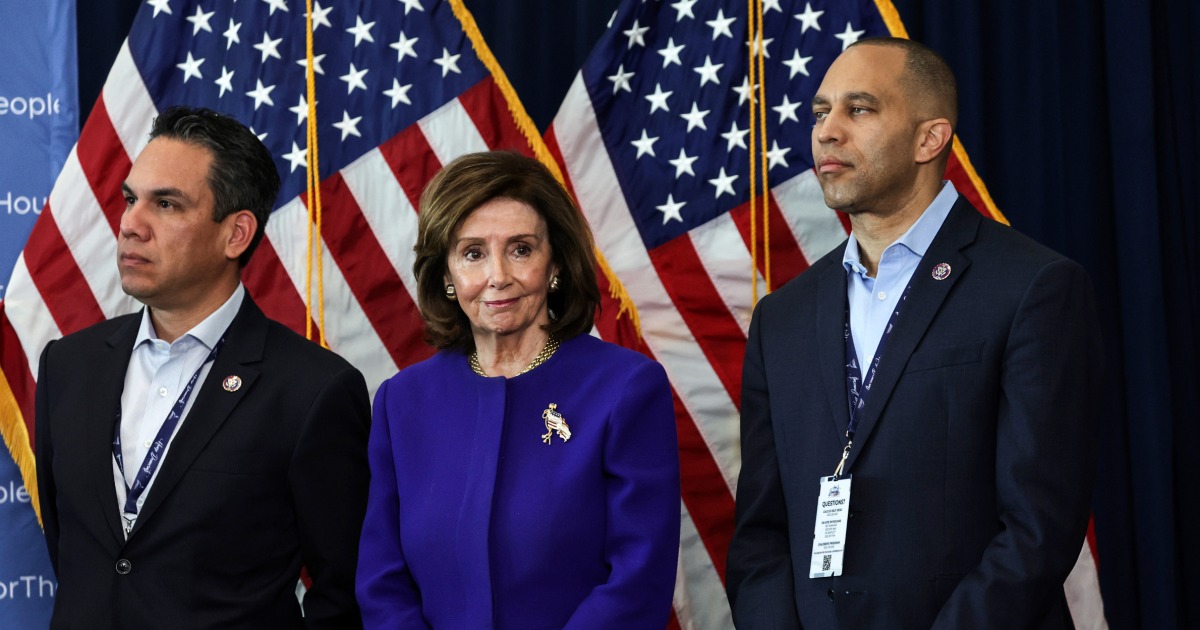Speaker Nancy Pelosi’s departure from leadership could easily have led to a power vacuum in which a host of ambitious lawmakers — old and young — publicly battled it out for the chance to lead House Democrats.
Instead, a new generation — Reps. Hakeem Jeffries, 52, of New York; Katherine Clark, 59, of Massachusetts; and Pete Aguilar, 43, of California — will almost certainly be elected to the top three leadership slots this week without a challenge or much fanfare.
There were a couple of bumps along the way. Some younger members are bitter that 82-year-old Majority Whip Jim Clyburn of South Carolina has opted to remain in leadership rather than follow Pelosi, also 82, and Majority Leader Steny Hoyer, 83, into the sunset.
But, by and large, Pelosi and her almost-certain successor, Jeffries, have been able to orchestrate a smooth passing of the torch from one generation to the next.
Shortly before Pelosi’s announcement Thursday that she was stepping down, Intelligence Committee Chairman Adam Schiff signaled he would not run for House leadership and would focus his efforts on a future Senate bid instead. That avoided a knock-down, drag-out fight between Schiff, a top Pelosi ally, fellow Californian and prolific fundraiser, and Jeffries, who is poised to become the first Black leader of a congressional caucus.
Hoyer, of Maryland, who has served in leadership since George H.W. Bush was president, also said he would not seek the top job and instead plans to return to the powerful Appropriations Committee.
And rather than taking on Clark for the No. 2 leadership post, Congressional Progressive Caucus Chair Pramila Jayapal of Washington decided to run for another term leading her caucus of roughly 100 House liberals.
However, Clyburn’s decision to remain in leadership represented a setback for those calling for “new blood” and hoping for a clean break from the triumvirate of Pelosi, Hoyer and Clyburn that had ruled the Democrats for the past two decades.
Clyburn announced he would run for his old post in the minority, known as “assistant leader,” which deprived younger members from occupying that role. It had been considered the No. 3 job.
Aguilar originally had his eyes set on the assistant leader position, but Clyburn’s move forced him to run for caucus chair. Under a new arrangement, assistant leader will shift to No. 4 and Democratic Caucus chair will move up to No. 3.
That left Rep. Joe Neguse, 38, who had been campaigning behind the scenes for months for caucus chair, as the odd man out.
Some Neguse allies urged him to stay in the race and take on Aguilar, frustrated by the domino effect created by Clyburn’s decision. But Pelosi quickly endorsed the slate of young leaders — Jeffries, Clark and Aguilar — and others followed suit, heading off any possibility of a rebellion from the rank and file and a messy leadership fight between Aguilar and Neguse.
“There are a lot of upset folks. The feeling is that Speaker Pelosi and Leader Hoyer had the grace to step aside, and people cannot believe that Clyburn is unwilling to do it. There is really resentment there about the down-ballot impact,” one younger House Democrat told NBC News.
“There’s incredulity at the idea that this is simply about holding onto power — not that there’s a particular goal in sight. It’s hard to feel like we are turning the page.”
A Clyburn spokesperson did not respond to a request for comment. Clyburn has called Jeffries, Clark and Aguilar “our new generation of Democratic Leaders” but has not weighed in on the Neguse situation.
Last week, a potential escape hatch emerged. Neguse informed colleagues on Nov. 21 he was officially dropping his bid for caucus chair and would run to be chair of the Democratic Policy and Communications Committee (DPCC), the House Democrats’ messaging arm, if the DPCC operation could be restructured.
Soon after, Jeffries, Clark and Aguilar informed their members in a joint letter that a rule change would be offered this week to do precisely that: overhaul the DPCC to have one elected chairman, likely Neguse, and three elected co-chairs underneath.
Some members have referred to that post as the “chair of chairs” and it’s a structure that has existed before.
Neguse almost certainly would be the favorite to win that race. The son of Eritrean immigrants and the first Black congressman elected from Colorado, Neguse saw his national profile rise after serving as a Democratic prosecutor during former President Donald Trump’s second impeachment trial.
For the past two years, he has served as one of four co-chairs of the DPCC, alongside Reps. Matt Cartwright of Pennsylvania, Debbie Dingell of Michigan and Ted Lieu of California; Dingell and Lieu are now among at least four candidates running for vice chair of the Democratic Caucus.
“Over the past two years, I worked alongside my fellow DPCC Co-Chairs to engage each member of our diverse caucus to develop our message framing,” Neguse said in a letter to colleagues Monday.
“That message of putting People Over Politics became an essential tool for our members as we defended our democracy and defied historic norms by limiting Republican gains in this year’s election.”
In addition to Dingell and Lieu, Reps. Madeleine Dean of Pennsylvania and Congressional Black Caucus Chair Joyce Beatty of Ohio are running for vice chair of the caucus. It’s the No. 5 slot, seen as a stepping stone to other top leadership roles.
The race to lead the Democratic Congressional Campaign Committee, the House Democrats’ campaign arm, for the 2024 cycle will feature a matchup between two Californians, Reps. Tony Cardenas and Ami Bera.
Share your story or advertise with us: Whatsapp: +2347068606071 Email: info@newspotng.com














